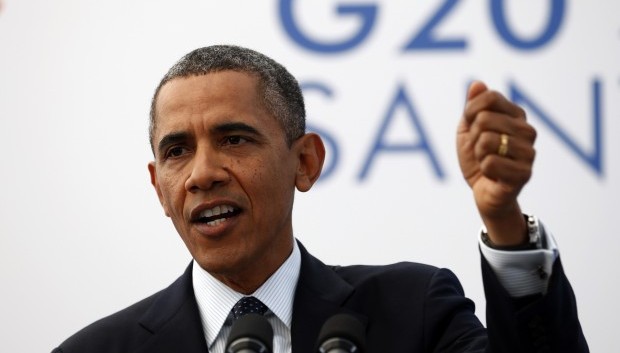
US president Barack Obama speaks during a news conference at the G20 Summit in St. Petersburg, Russia, on September 6, 2013. (Reuters/Kevin Lamarque)
London, Asharq Al-Awsat—In the wake of the G20 split over a possible US military strike on Syria in response to its alleged use of chemical weapons in Damascus’s eastern Ghouta district last month, President Barack Obama assembled an alliance of 11 countries who accuse the regime of Syrian president Bashar Al-Assad of responsibility for the purported chemical attack.
In what pundits have dubbed a minor diplomatic advance for Washington, 11 of the G20 nations signed a joint statement at the end of the summit calling for “a strong international response to a grave violation of the world’s rules.”
The statement said that evidence “points clearly to the Syrian government being responsible for the attack which is a pattern of chemical weapons used by the regime,” concluding that “the UN Security Council remains paralyzed, as it has been for two and a half years.”
The signatories included the UK, the US, France, Australia, Canada, Italy, Japan, South Korea, Saudi Arabia, Spain and Turkey.
The statement concluded: “The world cannot wait for endless failed processes that can only lead to suffering in Syria. We support efforts by the US and other countries to reinforce the prohibition on the use of chemical weapons.”
However, the statement fell short of explicit support for a “punitive” US military strike on Syria, with Russian president Vladimir Putin—a key supporter of the Assad regime—pointing out that although British prime minister David Cameron signed the statement, parliament’s vote against British military action in Syria showed that he does not speak for his country on this issue.
Russia, China, South Africa, India, Indonesia, Argentina and Brazil refused to sign the US-backed statement. It emerged on Saturday that Germany are likely to sign the joint statement.
The G20 split over Syria prevented the issuance of a joint statement signed by all parties.
Speaking on the final day of the summit, Putin promised to “help” the Assad regime in the event of a US military campaign, demonstrating Washington and Moscow’s conflicting positions on the Syrian crisis and Assad’s alleged use of chemical weapons.
“Using force against a sovereign state can only be done in self-defense, and Syria is not attacking the United States,” Putin said.
Putin and Obama did not have a formal bilateral meeting during the G20 summit in St. Petersburg, and Washington cancelled a planned meeting in Moscow that was to take place before the summit. However, the US and Russian presidents did meet informally on the G20’s sidelines, with Putin describing the meeting as “constructive, meaningful and cordial.”
The Russian president revealed that the meeting lasted between 20 and 30 minutes and “each of us kept with our own opinion.”
“There is dialogue: we hear each other and understand the arguments. He [Obama] disagrees with my arguments. I disagree with his arguments, but we do hear, and we try to analyze,” Putin said.
The US president now faces the tough task of persuading Congress to authorize military action in Syria. Congress returns from its summer recess on Monday and could vote on a Syria strike sometime early next week.
Obama is set to seek public support for a military strike on Syria in a White House address scheduled for Tuesday. Speaking before his return to the US from Russia, Obama said he would use the speech to “make the best case I can to the American people as well as to the international community for taking necessary and appropriate action.”
“The kind of world we live in and our ability to deter this kind of outrageous misbehavior is going to depend on the decisions that we make in the days ahead,” he added.
